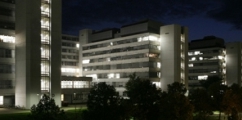CeBiTec Colloquium
Monday, April 29th 2013, 17 c.t.
G2-104, CeBiTec Building
Dr. Marc Kipping
Waters, Eschborn
Data Independent Acquisition
The seminar will explain the Data Independent Acquisition (DIA) using a multiplexed LC-MS experiment (LC/MSE) as an alternative to traditional Data Dependent Acquisition (DDA) in a LC-MS/MSMS switching experiment.
The new technique has been discovered in early 2000’s and developed over the last 10 years with the main objective of overcoming some of problems with the enormous complexity of samples in Shotgun Proteomics experiments. Obvious advantages of a DIA experiment are in example (a) not under-sampling the data, (b) unbiased acquisition, which fits better with the untargeted nature of the Shotgun experiment, and (c) the uninterrupted collection of qualitative and quantitative information about all ions formed in the ESI process of the experiment. DIA can help to increase sequence coverage of identified proteins, it enables precise label free quantification and improves reproducibility between experiments.
A DIA challenge is the reduced primary specificity within the raw data due to the composite nature of precursor and product ion spectra, which is a result of co-elution of analytes and no precursor ion selection in a DIA experiment. Therefore, the ability of a system to separate ions either by LC or MS is most important for the specificity in a DIA experiment. A further separation can be achieved by adding Ion Mobility Spectrometry (IMS) to the experiment as an additional dimension. A LC/IMS/MSE experiment became technically possible more recently, after Waters Corporation developed the Synapt G2. This new type of experiment improves the specificity and the results of a DIA experiment dramatically. Both, the necessary technical requirements on a Synapt and improved results in Shotgun Proteomics experiments will be discussed in the seminar.
Host: Dipl. Chem. Jens Sproß



